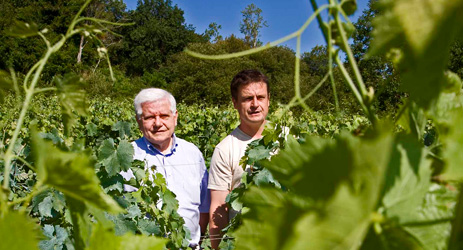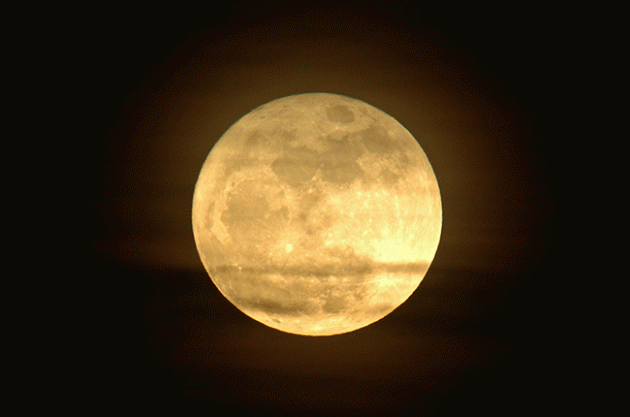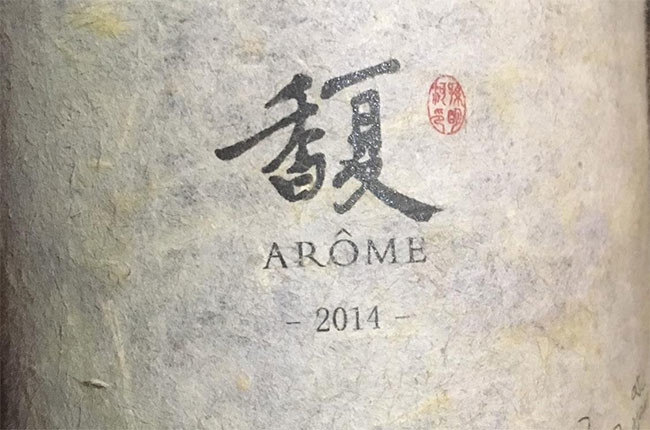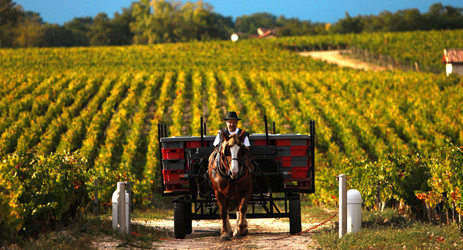You wouldn’t think that the wine that was named ‘greatest of all’ by one of the most influential wine media in the world would have difficulty getting quality approval in its own back yard.

But Jean-Pierre Amoreau, owner of Chateau Le Puy, has received numerous refusals for his cuvée Barthélemy wine to be accorded the AOC Francs Côtes de Bordeaux status on its labels. This is the wine whose 2003 vintage was acclaimed in the final episode of the tv series based on hugely popular Japanese manga Drops of God for its ‘400 years without a drop of pesticide’ and its status as a ‘miracle wine… produced with the most natural methods.’

‘I can understand it,’ says Amoreau with the fervour of a man relishing his outsider status. ‘We may be recognised for our excellence, yet we are very different in style from the wines of our neighbours. The local AOC system is based on communes, not terroir, and rewards conformity.’
Amoreau didn’t capitalise on his manga appearance in the expected way (in fact, he withdrew the wine entirely from circulation for a few weeks, and then put it back on the market at the original price with instructions to ‘prioritise loyal customers’). But it may have helped crystallise his plans for appellation-recognition. The tv episode came in March 2009, and two years later, in August 2011, Amoreau submitted an application to the National Institute of Appellations of Origin (INAO) for the creation of a new AOC, for just 5.6 hectares of his 50 hectare vineyard, with a distinct limestone composition. The vines are almost entirely those that go into cuvée Barthélemy.

‘The difference between local AOC acceptance and the feedback we were getting elsewhere just underlined for me why we needed our own appellation,’ he agrees. ‘After a certain point, it seemed a necessity.’
Currently engaged in ‘friendly’ negotiations, the request has seen ‘no’ noises from the regional and national INAO, but a ‘yes’ from the local Côtes de Francs syndicate. Amoreau is ready to take the request to the European courts, as legally the EU allows vineyard owners to ask for their own AOC if they can prove sufficiently robust reasons for it.
I wrote about this as a news story for Decanter.com a few weeks ago, and headed over to the estate itself as soon as I was able. Even after a brief telephone interview, it was clear that Amoreau would amply reward a longer conversation.

It’s a steep climb up to Le Puy through the satellites of St Emilion towards the village of St Cibard. The chateau itself stands at 107 metres in altitude, atop a promontory that the family refers to as the ‘plateau des marveilles’ – the plateau of marvels, where most of the vines are planted. Hidden in a copse at the far end of their land is a circular group of standing stones dating back to 3,000BC. This oppidum, they insist ‘resonates cosmic energy to the vines themselves’ (and, yes, this is a biodynamic vineyard, as if you needed to ask).
There has been an Amoreau making wine on this place since 1610, and today’s owner works with his son Pascal and daughter Valérie. Together, they have developed the Quality Charter that is required for all AOCs in France. The Le Puy charter details that this is a biodynamic-only AOC, as certified by Demeter, Ecocert, Nature & Progrés, with one hectare of wild flowers or hedgerows conserved for every one hectare of vines. Chaptalisation is not allowed and all harvesting is by hand, with no green harvesting allowed. Only natural yeasts during fermentation; bottling at the chateau only during a full moon; no added sulphur for three cuvees, including Bartélemy; minimal sulphur use for the others. Wine ageing takes place with no new oak – the barrels used at the property are between five and 50 years old, in complete opposition to most Bordeaux chateaux which use new oak, or at most two or three year old.
‘This is easily one of the most restrictive AOC charters in France,’ says Valérie Amoreau. ‘We believe in the restrictions of appellations, and their drive to quality, which is why we want our own instead of simply choosing to bottle our wines as Vin de France, which would be much more liberal. But it’s not just our quality charter that is different, it’s the geology that underpins our wine.’ Renowned specialist Claude Bourguignon carried out a geological survey, and has written a report in support of the project, as have two local experts: Michel Rolland and Pascal Chatonnet.

While they are waiting for a final decision, they are getting on with other projects – the most ambitious of which is the recently opening of shops in China that sell purely Chateau Le Puy. So far these are in Nanjing, Shenzen and Shanghai, with plans for 15 in total. The first 250m2 boutique opened in April 2012, with a tasting room, an area for taking orders and an area for wine stocks. ‘We use traditional distribution channels in Japan and Taiwan,’ says Amoreau. ‘But Mainland China is such a new market that new methods can be explored. This means we can control our distribution and guarantee the authenticity of our wines. Customers can either buy it through our shops, or in restaurants’.
It seems like a huge expense for one small winemaker to take on, and I wouldn’t bet on the stores still being there in five years time. But one thing I would bet on is that if the AOC Le Puy case ends up in the European Court, Pascal Amoreau won’t back down until he gets his way.
‘Will we have to go that far?’ He exchanges a conspiratorial smile with his daughter. ‘That all depends on the intelligence of the people making the decisions in France.’

Columnist Introduction
Jane Anson is Bordeaux correspondent for Decanter, and has lived in the region since 2003. She is author of Bordeaux Legends, a history of the First Growth wines (October 2012 Editions de la Martiniere), the Bordeaux and Southwest France author of The Wine Opus and 1000 Great Wines That Won’t Cost A Fortune (both Dorling Kindersley, 2010 and 2011). Anson is contributing writer of the Michelin Green Guide to the Wine Regions of France (March 2010, Michelin Publications), and writes a monthly wine column for the South China Morning Post in Hong Kong, where she lived from 1994 to 1997. Accredited wine teacher at the Bordeaux Ecole du Vin, with a Masters in publishing from University College London.
Click here to read all articles by Jane Anson>>
All rights reserved by Future plc. No part of this publication may be reproduced, distributed or transmitted in any form or by any means without the prior written permission of Decanter.
Only Official Media Partners (see About us) of DecanterChina.com may republish part of the content from the site without prior permission under strict Terms & Conditions. Contact china@decanter.com to learn about how to become an Official Media Partner of DecanterChina.com.











Comments
Submit